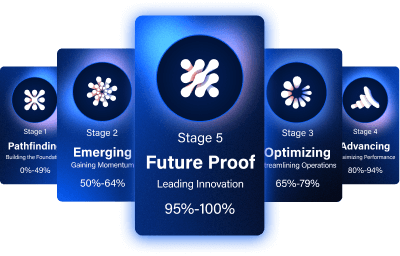Throughout my career, I’ve seen accounting firms approach continuing education in two distinctly different ways:
- Learning equates to CPE; it’s just another box to check—a requirement to maintain licensure.
- Learning is a competitive advantage.
You cannot just abide by the credit requirements to maintain CPE and expect to stand out. Preparing yourself and your firm for the future requires a competitive mindset.
In this post, discover:
- What the “CPE checkbox” mentality is and why it’s harmful.
- Educational ROI.
- Topics to explore beyond CPE coursework.
“The companies that outlearn other companies will outperform them.” Vidya Krishnan, Chief Learning Officer, Ericsson
The “CPE checkbox” mentality
Many accountants approach their continuing education with the “checkbox mentality.”
You may have succumbed to the checkbox mentality if:
- You’ve scrambled at CPE renewal time to find accredited classes.
- You’ve chosen the easiest, quickest courses to fulfill licensure requirements.
- You aren’t considering which courses may help you grow professionally.
Sound familiar?
But in a profession where regulations and technologies are constantly evolving, this approach doesn’t just hurt your professional growth—it limits both your value to your firm and your firm’s potential.
Educational ROI
The value of ERP to businesses and their employees
The ROI on building a true learning culture is impressive.
In 2012, Cigna, in partnership with The Lumina Foundation, wanted to quantify the value of ERP (educational reimbursement programs). They found out that it benefited their people and their bottom line:
- ERP resulted in 129% ROI due to fewer talent management costs.
- Educational program participants achieved 43% higher wage gains.
The ROI framework below illustrates how employee credential programs create measurable business value through multiple pathways, from increased productivity and enhanced employee engagement to reduced operational costs and improved talent retention.

More recent findings also suggest that if an employer offers career development, the employee is more likely to stay.
- Companies with a “strong” learning culture have a 57% retention rate. (LinkedIn Learning)
In our profession, where finding and keeping good talent feels like searching for a unicorn, that’s huge.
Related → How to hire, manage, and retain the best talent for your firm
5 educational topics to explore
While state boards require technical CPE (accounting, auditing, taxes) and non-technical CPE (ethics, communications, personal development), truly forward-thinking accountants don’t limit themselves to these categories. They explore:
- Data analytics and visualization
- AI and automation technologies
- Industry-specific knowledge for their clients
- Leadership and business development skills
- Client communication techniques
Remember, you can earn CPE through various activities beyond traditional courses—webinars, board service, publishing articles, and even relevant volunteer work. The key is to be strategic about what you learn, not just how many credits you earn.
How to get staff excited about learning
1. Lead by example
As with most things, establishing a learning culture starts with leadership. When leaders get excited about learning beyond basic CPE requirements, that excitement trickles down to everyone else.
You may be wondering, “How can I show my excitement about learning?” Well, you’re in luck—here are my best tips:
- Share what you’re learning: Have you read a good article or book lately? Learned a new tech trick? Listened to a helpful podcast? Share it in your next team meeting!
- Create a CPE strategy, not just a CPE log: Help your team identify valuable learning opportunities that align with their interests and your firm’s.
- Recognize learning efforts: Did someone complete a challenging course or get a new certification? Make a big deal of it—not just when they hit the 40-hour mark!
2. Make learning fun, not obligatory
Is it possible to get your team as excited about learning as they are about remote work and unlimited PTO? Maybe…maybe not. Here are some ideas to help bring a little more “fun” into the “fundamentals”:
- Set up learning lunches: These informal sessions can even qualify for CPE if structured properly.
- Create a learning library: Set up a space where people can access and share resources beyond basic CPE materials.
- Gamify your CPE: Set up friendly competitions around learning new skills and award points for completing courses or sharing knowledge with the team.
- Highlight a tech tool of the month: Introduce and explore a new accounting or productivity tool each month as part of your firm’s education program.
Related → 4 reasons to build a tech-forward accounting firm
How to take learning to the next level
Want to take your learning mindset to the next level? Join me at RightNOW 2025, our annual event for accounting and tax professionals. This isn’t just another CPE factory—it’s a gathering of forward-thinking professionals who understand that staying competitive means staying curious.
I’ll be leading a session called “Purposely invest in yourself through lifelong learning” on May 21 from 11:30 a.m. to 12:20 p.m. CST.
Expect to dive into evolving methods for upskilling in our increasingly automated profession, including:
- The pros and cons of intrinsic vs. extrinsic motivation for learning programs.
- Concepts that help foster critical thinking for novel problems.
- Key stats that support the value of continuous learning.
You’ll walk away with practical strategies to implement in your firm—and yes, by attending my session, you’ll also be eligible for CPE credits. But more importantly, you’ll be part of a community that values learning as a competitive advantage, not just a requirement.
Those who invest in learning beyond the minimum requirements aren’t just maintaining their licenses—they’re maintaining their relevance.
Remember, our line of work is constantly changing. Those who invest in learning beyond the minimum requirements aren’t just maintaining their licenses—they’re maintaining their relevance. I hope to see you in Nashville, where we can explore what it truly means to be lifelong learners in the accounting profession.



